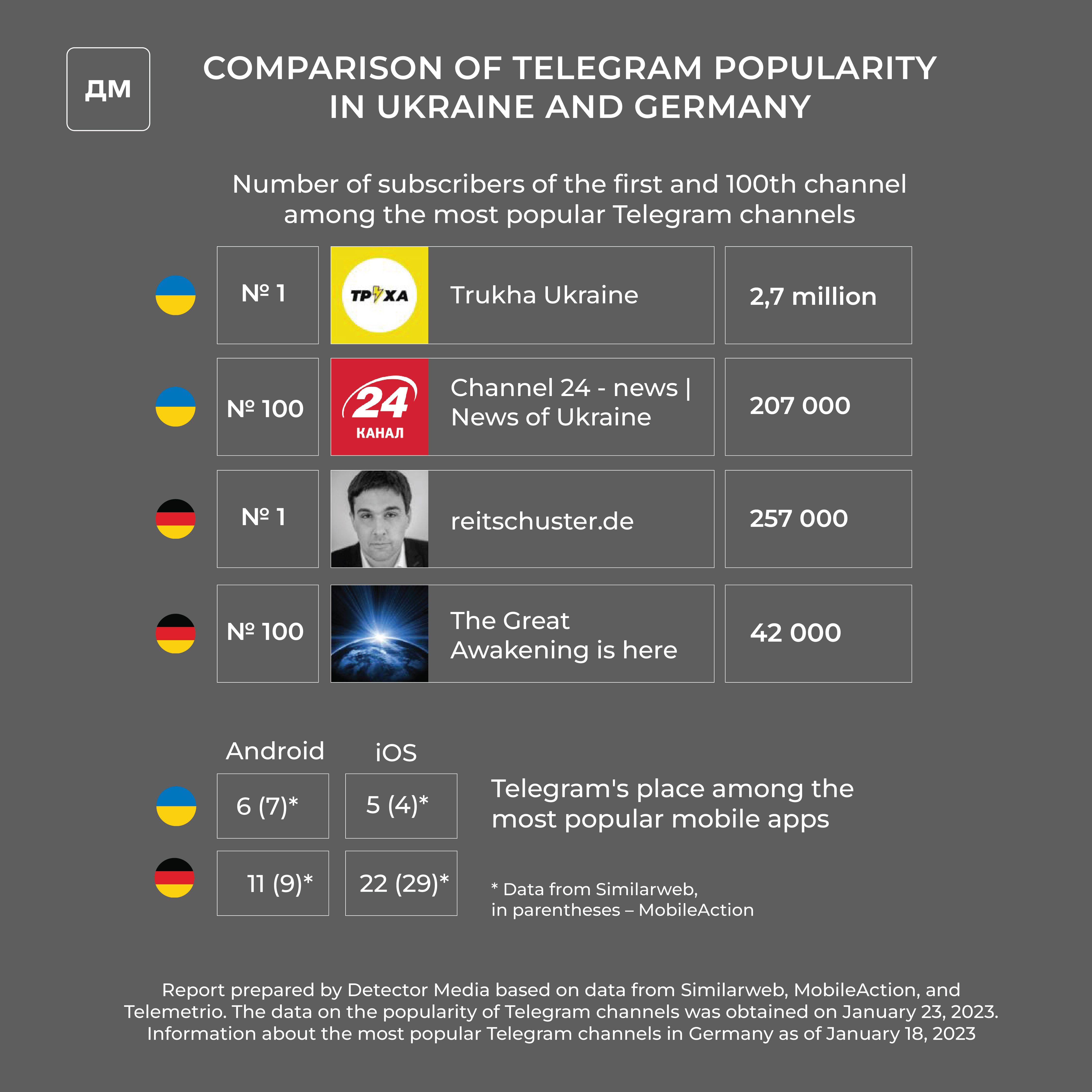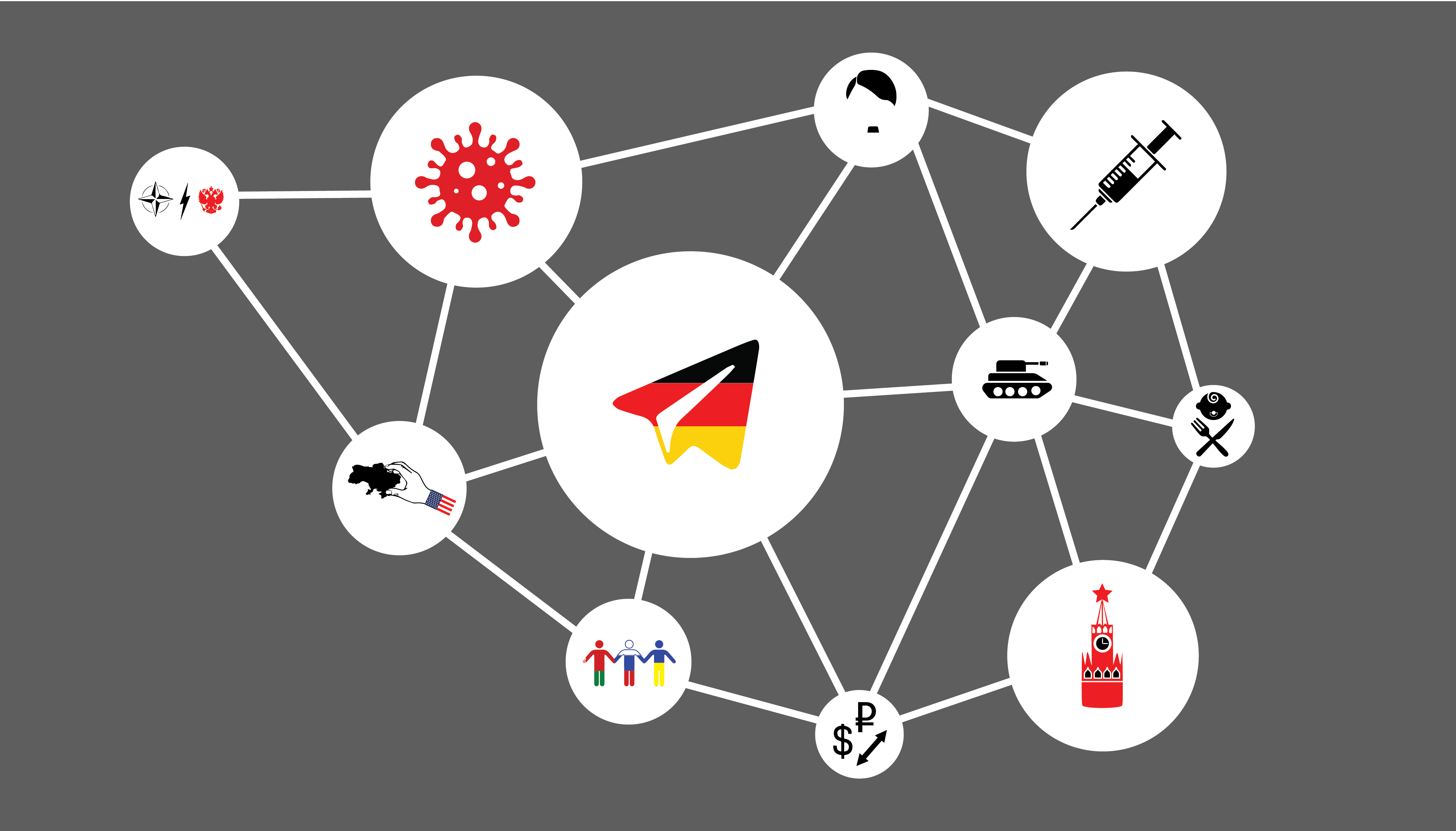


Detector Media has documented a heightened presence of Russian disinformation on social media during political events, such as international summits, organisation meetings, and negotiations on Ukraine aid. Since the end of 2022, both Ukrainian and international media have been mentioning Germany more often in the context of military assistance to Ukraine, namely the transfer of Leopard 2 tanks. Against the backdrop of these discussions, on January 3, 2023, Reuters released an investigation into the influence of pro-Putin agents in Germany, which described how these agents were trying to turn Berlin against Ukraine. The investigation revealed that some German public figures advocating a change of policy with regard to Ukraine had links to the Russian state and the far-right. The publication focused on personalities, mentioning in passing that some pro-Russian activists spread the Kremlin’s messages to German-speaking online audiences. Russian propaganda often spreads its narratives and ideas through anonymous sources on social and mass media and then moves to a new level by influencing the statements of experts, politicians, and activists who knowingly or unknowingly spread Russian disinformation messages.
Detector Media decided to investigate how Russian propaganda uses Telegram to influence the German-speaking audience and what kind of information campaigns it conducts, and compared the approaches used by the Russian propaganda machine to influence the Ukrainian and German audiences.
Українською читайте тут.
Research conducted by: Ira Riaboshtan, Orest Slyvenko, Oleksiy Pivtorak
The research is based on data from Telegram channels provided by LetsData
What is Telegram in Germany?
Telegram is one of the main sources of information in Ukraine. As of January 23, according to SimilarWeb, a company that provides data on the popularity of Internet resources, Telegram was ranked fifth overall in mobile apps among iOS users and sixth among Android users. Similar figures are cited by MobileAction, a company that provides data for mobile app marketers. According to their data, Telegram is the fourth most popular app on iOS and seventh on Android.
In Germany, the popularity of Telegram is lower. According to Similarweb, Telegram ranks 22nd among iOS apps and 11th among Android users. According to MobileAction, Telegram is the 29th most popular app on iOS in Germany and the tenth most popular app on Android.

The number of channels targeting Ukrainian and German audiences also differs. According to Telemetrio, a Telegram analysis service, there are 5,800 channels aimed at Ukrainians, while the German audience has a choice of 3,100 channels.
The size of the audience of the largest channels on Telegram also differs. In Ukraine, the most popular channel, Trukha Ukraine, has 2.7 million subscribers, and the least popular channel in the top 100, Channel 24 News | News of Ukraine, has 207 thousand subscribers. By comparison, the most popular German Telegram channel reitschuster.de has 257,000 subscribers. The Great Awakening Is Here, the 100th most popular channel as of January 18, had 42,000 followers.
The most widely utilised Telegram channels in Germany are primarily comprised of personal blogs that present news and personal reactions to events, rejection of the COVID-19 pandemic, as well as narratives regarding esoteric topics and knowledge that deviates from accepted scientific norms. Unlike in Ukraine, where most of the most popular media outlets have popular channels on Telegram, the most popular media outlets in Germany or Austria sometimes have Telegram channels, which, however, do not appear on the list of the top 100 Telegram channels. The top 100 German-language Telegram channels in the media segment include the German magazine Compact, the TV channel AUF1, the media platform Apolut, and the Austrian publication Wochenblick. According to Similarweb, the websites of the aforementioned German publications are no further up than the fourth hundred among local media. The Wochenblick website is ranked 101st in terms of popularity among Austrian media.
While Telegram is not one of the top ten most popular apps in Germany, the influence of this social network can be observed indirectly by the German government’s attempts to regulate its operation. The German authorities have repeatedly expressed concern that Telegram is being used to spread disinformation about the coronavirus pandemic and organise protests that turn violent. Experts in Germany have also often expressed concern that the app is becoming a hub for extremism and radicalisation. According to media reports, far-right and extremist groups are increasingly turning to Telegram after being kicked off other social media platforms such as Facebook and Twitter.
In October 2022, the German Federal Ministry of Justice fined Telegram €5.125 million for violating the law. Telegram was accused of breaching its obligation to ‘maintain communication channels in accordance with the law’ (€4.25 million fine), as well as refusing to appoint an authorised representative in Germany (€875,000 fine). For the most part, the German authorities have been criticising the messenger for the past few years due to hate speech being freely spread on Telegram; the messenger enables so-called anti-vaxxer, conspiracy theorists, and neo-Nazis. This problem is clearly illustrated by the top 100 most popular Telegram channels in the German segment.
Types of disinformation in German Telegram channels
Similar to Ukraine, a majority of the top 100 Telegram channels in Germany provide breaking news or opinions on events. As with popular Ukrainian Telegram channels, the news is often presented without proper context or with biassed comments that should be understood as the authors’ personal viewpoints rather than credible news sources. One such example is the top German Telegram channel, reitschuster.de, which has 247,000 subscribers and is run by journalist Boris Reitschuster. Reitschuster’s channel features articles from his personal website with accompanying brief comments. He is the author of the book Putinocracy, which details Vladimir Putin’s establishment of an authoritarian regime through corruption and fear. Although Reitschuster holds a critical view of Russia, where he lived and worked during the 1990s and 2000s, his coverage of events related to Ukraine is often from a populist perspective. On his website and Telegram channel, one can find reports claiming that refugees from Ukraine receive higher benefits than refugees from other countries or even some German pensioners. This claim has been a recurring Russian disinformation message regarding Ukrainian refugees since the spring of 2023.
Reitschuster also claims there is a ‘fictitious COVID-19 pandemic’. For example, in a post on January 24, he wrote: ‘The number of coronavirus cases may be linked to political sentiment. Where the wrong choices are made, there is more danger. At least that’s what the new statement from the federal government suggests.’ Since 2020, German fact-checkers from correctiv.org have cited Reitschuster’s misrepresentation of the COVID-19 pandemic at least 26 times.
The resistance to the coronavirus pandemic is a prominent theme among a significant portion of the top 100 most popular Telegram channels in Germany. These channels generally focus on the adverse effects of receiving the COVID-19 vaccine or, like the Telegram channel Gesundheitswesen in der Krise, with 68.4 thousand followers, refer to the pandemic as an ‘orchestrated’ event. The administrators of the Telegram channel CORONA AUSSCHUSS, with 43.2 thousand subscribers, call for an investigation into the circumstances surrounding the pandemic in order to create a society ‘without muzzles’.
The German Federal Ministry of Health also has a Telegram channel with 224,000 subscribers, where it talks about responding to the COVID-19 pandemic. However, the total reach of Telegram channels that present alternative views on the virus and the dangers of vaccination is much greater than that of the official source.
A number of Telegram channels in Germany report or comment on current events. Typically, the most popular Telegram channels intersperse news with images and videos featuring animals, children, practical tips, or philosophical musings. This is the format of the second most popular German Telegram channel, Vivoterra, which boasts 247.4 thousand subscribers and is referred to by its creators as a ‘treasure trove of knowledge’ at the end of each post. The channel features a significant amount of news about Ukraine. In reference to a news story about the transfer of tanks from German army warehouses to Ukraine in late January 2023, the creators of Vivoterra reported the details of the story and then added a claim that the US had declared war on Russia and that ‘Putin also knows that this war is not coming from the Germans’. There is a noticeable theme of fear of Russia in German Telegram channels. For example, just prior to the announcement of the transfer of German tanks, the Telegram channel Antillumonaten TV, with 76,000 subscribers, published a quote from a Russian expert suggesting that the Russians could use tactical nuclear weapons. Such messages are likely meant to create a sense of threat from Russia and to emphasise the idea that ‘one’s own country is closest to the heart’ and that one should not get involved in someone else’s war.
Russian diaspora in the German-language Telegram and Germans spreading Russian talking points
In the top 100 most popular Telegram channels in Germany, there are a significant number of channels that promote messages favourable towards Russia. Of these, two stand out as being directly connected to Russia. These are the Telegram channel 🇷🇺Russländer & Friends 🇩🇪, with 75,500 subscribers, and the German-language branch of the Russian propaganda outlet, RT DE, with nearly 47,000 subscribers. These channels propagate classic Russian propaganda messages, such as that the West aims to destroy Russia and that it supports Ukrainian war crimes.
In early January 2023, Reuters highlighted another channel from the pro-Russian network, Putin Fanclub, which boasts 36,000 followers. This channel mainly disseminates news about Putin’s meetings with officials, quotes from his speeches, and criticism of Ukraine. According to Reuters analysis, this is just one of at least 27 channels that spread pro-Kremlin messages to a total audience of approximately 1.5 million subscribers. Detector Media has analysed the connections of the Putin Fanclub Telegram channel and investigated the messages that are spread by those Telegram channels that have referenced it at least once. Among them are:
- the Telegram channel of the pro-Russian German Vyacheslav Seewald, who, according to Reuters, is the one who creates content for the Putin Fanclub;
- the German editorial office of the propaganda outlet RT;
- probably the channel of an actual doctor and anti-vaxxer, Heinrich Fiechtner;
- several other Telegram channels that constantly spread pro-Russian news.
The authors of these Telegram channels spread unmasked disinformation. Channels associated with Putin Fanclub relay the Russian agenda without any additional commentary for the domestic audience or only share news from Western and international media that reinforce the legitimacy of pro-Russian views. In other words, the propaganda itself does not undergo much modification for the German consumer. That is why the common narratives are easy to recognise, as Russian propaganda within the German segment is quite primitive.
In particular, such channels raise the topics of ‘Nazi Ukraine’, ‘economically weak West’, or an ‘invincible Russian army’. Also, messages about ‘the shelling of Donetsk by Ukrainian Nazis and Ukrofascists’, ‘the US desire to rule the West and beyond’, or ‘the rapid development of the Russian economy’ are absolutely typical of Russian disinformation in Germany.
This shows that Russian propaganda generally spreads disinformation messages favourable to Russia to foreign audiences. Comments on posts in these Telegram channels often contain disdain for Ukrainians, and certain progress in German assistance to Ukraine is condemned as ‘support for the Nazis’.
When comparing Russian disinformation aimed at Ukrainians with that aimed at German audiences, Ukrainian disinformation looks more complex. This can be partly explained by the fact that Telegram is more popular as a news source in Ukraine, and propagandists are better able to manipulate Ukrainian news stories rather than just parroting the Russian propaganda point of view.
In the first 18 days of 2023, we recorded more than 100 propaganda messages, manipulations, and fakes spread by Telegram channels that cited Putin Fanclub. The topics of these messages also correspond to pro-Russian slogans spread by the most popular German-language Telegram channels. With the exception of conspiracy theories about COVID-19, they fit perfectly into the set of messages that Russian propaganda spreads to the Ukrainian audience and abroad. There, as well as among the top 100 German Telegram channels, you can find statements that:
- Russia is conducting a ‘special operation against the Ukrainian Nazis’ and the US hegemony, all the while becoming stronger despite the sanctions;
- Nazi supporters and corrupt officials run Ukraine. They mock those who love Russia and commit war crimes in the territories they control;
- The leaders of the United States and Europe have conspired against ordinary people. They have entered into a confrontation with Russia. As a result, the citizens of these countries have to endure inflation and rising utility tariffs;
- Citizens of the United States, the EU, and Ukraine must continue protesting against the actions of their governments and demand that they stop funding the ‘Ukrainian Nazis’ and make peace with Russia.
The study highlights that German Telegram channels are serving as a channel for the propagation of various conspiracy theories, unverified information regarding the coronavirus and vaccination, and Russian disinformation. The Russian propaganda narratives discovered in the anonymous German Telegram channels demonstrate that Russia is systematically utilising disinformation to attain its geopolitical objectives, not just in Ukraine but across the world. The research reveals that Russian disinformation is not limited to Germany but is present in numerous European countries and spreads similar narratives. The messages and narratives found in the German Telegram channels, such as the portrayal of Ukraine as ruled by Nazis and Russia’s victory in the war, are intended to change the Western societies’ perspective of Ukraine, discredit Ukraine and Ukrainians, and show Ukraine as weak and unable to resist the allegedly mighty Russia. However, the Russian disinformation in the German Telegram is less refined than in the Ukrainian Telegram, where Russia tries to propagate a more diverse range of disinformation messages. In the German Telegram, the disinformation is more general, with a focus on consistent narratives, such as the United States and European leaders conspiring against their peoples and confronting Russia, and Russia not being the initiator of the war.
A report by Princeton University in the United States sheds light on the extent of Russia’s involvement in the use of disinformation as a means of foreign influence. The study, entitled ‘Trends in Online Foreign Influence Efforts,’ found that Russia is the world leader in this regard, with a staggering 62% of all cases of interference in the internal affairs of other countries being attributed to the country. This highlights Russia’s strategic use of information as a tool to propagate its own messages and influence the societies of other nations.
Russian propaganda through disinformation has a dangerous aim — to alter reality. This is particularly worrying in light of the proliferation of anti-Ukrainian messages, such as regarding the provision of weapons to Ukraine in its battle against the aggressor country. The Russian propaganda machine is consistently manipulating the topic of weapon provision, claiming that Western countries must cease providing arms to Ukraine as they merely perpetuate war and fail to bring peace; they undermine the defence of the countries that offer weapons; the weapons are susceptible to theft through corruption and incite war globally. Recently, Russian propaganda agents fabricated opinion polls among Germans and claimed that 70% of them opposed augmenting military aid to Ukraine. This helps to bolster the notion that support for Ukraine is declining and spreads these messages, primarily through anonymous Telegram channels. Disinformation narratives are particularly damaging when the people of the EU are starting to feel the socioeconomic consequences of the war in Ukraine.
Telegram, as a platform, is becoming a major contributor to the spread of disinformation and conspiracy theories due in large part to its permissive approach. The founder of Telegram, Pavel Durov, has shown a tendency to protect anonymous channels, despite their encouragement of authors to refrain from sharing content that breaches Telegram’s policies or the guidelines set by app stores. This lax approach has allowed propagandists to advance Russia’s interests openly, reaching massive audiences with relative immunity.
This publication has been produced with the financial assistance of the European Union. Its contents are the sole responsibility of Detector Media and do not necessarily reflect the views of the European Union.


